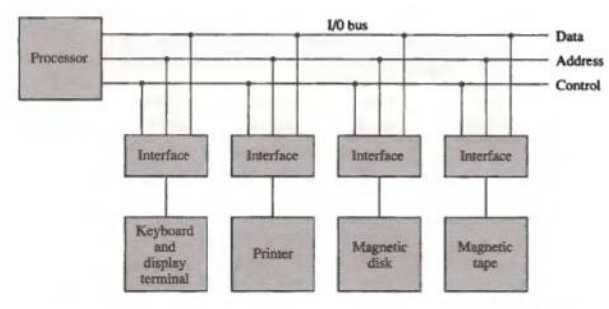The Input/Output (I/O) interface is a crucial component that allows the Central Processing Unit (CPU) to communicate with peripheral devices.
The I/O interface manages the exchange of data between the CPU and external devices, enabling input from devices like keyboards and mice and output to devices like displays and printers.

Purposes of I/O interface:
- Communication Facilitation:
- The I/O interface enables communication between the CPU and peripheral devices, allowing the exchange of data and control signals.
- Standardization:
- It defines standardized protocols and formats, ensuring compatibility between different types and brands of peripherals. This standardization promotes interoperability within the computer system.
- Data Transfer Management:
- The I/O interface manages the transfer of data between the CPU and peripherals. It handles addressing, synchronization, and data transmission details, relieving the CPU from the intricacies of low-level I/O operations.
- Control and Status Monitoring:
- Through control and status registers, the I/O interface provides the CPU with information about the state of connected devices. This allows the CPU to initiate, monitor, and control I/O operations efficiently.
- Error Handling:
- The I/O interface incorporates mechanisms for error detection and correction, enhancing the reliability of data transfer between the CPU and peripherals.
- Interrupt Handling:
- It plays a crucial role in handling interrupts, informing the CPU when a peripheral requires attention or when a data transfer is complete. This allows the CPU to respond promptly without continuous polling.
- Memory-Mapped I/O:
- In some cases, the I/O interface uses memory-mapped I/O, where certain memory addresses represent control and data registers of peripherals. This simplifies the programming model as I/O operations resemble memory access.
- Buffering and Caching:
- The I/O interface may include buffers and caches to temporarily store data during transfers, helping manage variations in data rates and ensuring smooth operation.
4 Comments
Ayush dubey · December 28, 2023 at 5:09 am
Sir aap boht badhiya padhate ho ❤️
Ayush dubey · December 28, 2023 at 5:09 am
Nice website
Diwakar ojha · December 28, 2023 at 5:11 am
Nice
Asmit Mall · December 28, 2023 at 5:11 am
Nice websites